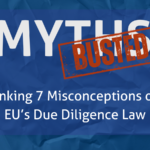CAN Europe commissioned a study that looked at carbon leakage claims in the cement sector and found evidence that emissions increased because of free allocation.
Careful analysis of the data points to the fact that the increase in emissions intensity in the cement sector was enabled exactly because of faulty ETS leakage rules. Such mistakes have to be avoided in the 4th trading period. The carbon leakage debate must be informed by sound analysis and not be driven by industries that are looking to continue windfall profits they have made due to perverse incentives under the Phase 3 free allocation rules.
CAN Europe who supported the enclosed analysis calls for:
A highly targeted set of carbon leakage thresholds. Such a focused tiered approach to carbon leakage can ensure that free allowances are not given to industries that do not face significant and proven competitiveness risks. Such a tiered approach should be seen as a transitionary measure as the goal has to be 100% auctioning with revenues being used to support the rapid decarbonization of Europe’s industry and the power sectors. ETS revenues should furthermore be used to fund a just transition for workers and for international climate action.
It is vital to note that even the best approach to carbon leakage cannot, by itself, turn the ETS into a policy tool that catalyzes the rapid emissions reductions we need to see if we are to avoid the most severe effects of climate change. For that the ETS revision has to include
1) raising the target in line with the Paris Agreement to limit temperature rise to 1.5 degrees,
2) permanently eliminating the large allowance surplus,
3) ensuring no new surplus is created due to an inflated starting point in 2021.

